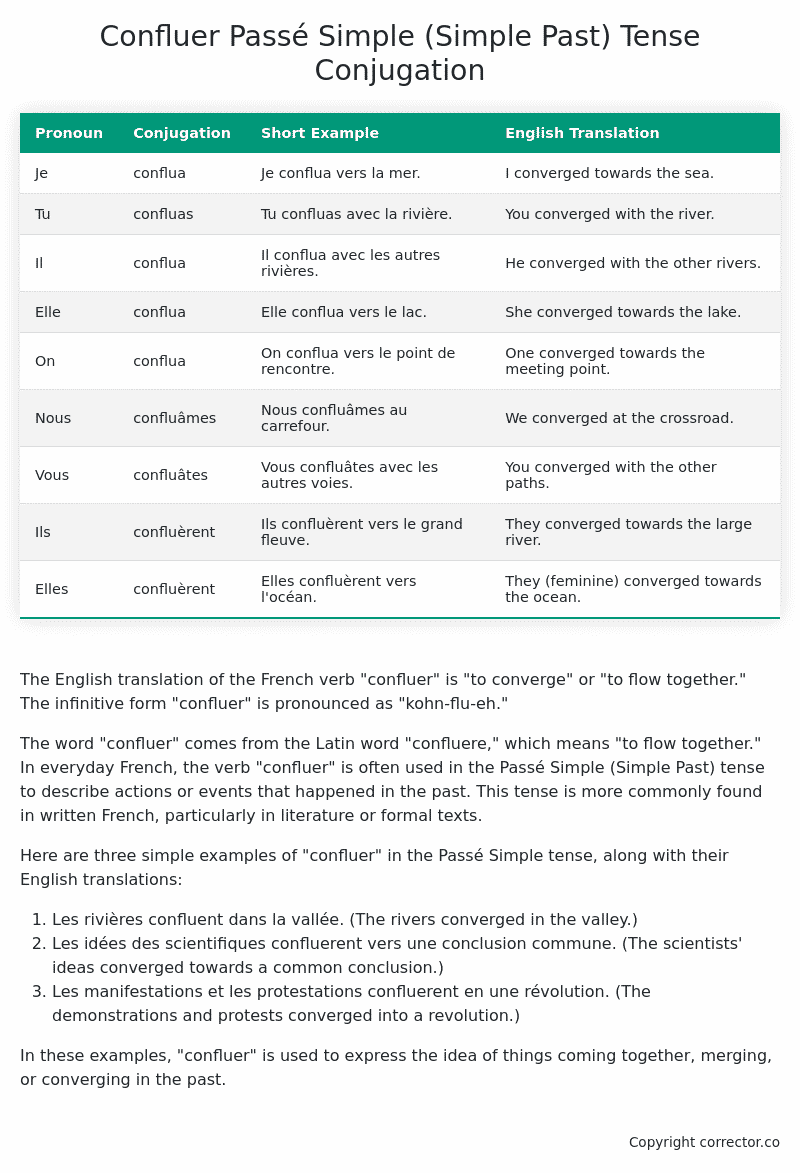Passé Simple (Simple Past) Tense Conjugation of the French Verb confluer
Introduction to the verb confluer
The English translation of the French verb “confluer” is “to converge” or “to flow together.” The infinitive form “confluer” is pronounced as “kohn-flu-eh.”
The word “confluer” comes from the Latin word “confluere,” which means “to flow together.” In everyday French, the verb “confluer” is often used in the Passé Simple (Simple Past) tense to describe actions or events that happened in the past. This tense is more commonly found in written French, particularly in literature or formal texts.
Here are three simple examples of “confluer” in the Passé Simple tense, along with their English translations:
- Les rivières confluent dans la vallée. (The rivers converged in the valley.)
- Les idées des scientifiques confluerent vers une conclusion commune. (The scientists’ ideas converged towards a common conclusion.)
- Les manifestations et les protestations confluerent en une révolution. (The demonstrations and protests converged into a revolution.)
In these examples, “confluer” is used to express the idea of things coming together, merging, or converging in the past.
Table of the Passé Simple (Simple Past) Tense Conjugation of confluer
| Pronoun | Conjugation | Short Example | English Translation |
|---|---|---|---|
| Je | conflua | Je conflua vers la mer. | I converged towards the sea. |
| Tu | confluas | Tu confluas avec la rivière. | You converged with the river. |
| Il | conflua | Il conflua avec les autres rivières. | He converged with the other rivers. |
| Elle | conflua | Elle conflua vers le lac. | She converged towards the lake. |
| On | conflua | On conflua vers le point de rencontre. | One converged towards the meeting point. |
| Nous | confluâmes | Nous confluâmes au carrefour. | We converged at the crossroad. |
| Vous | confluâtes | Vous confluâtes avec les autres voies. | You converged with the other paths. |
| Ils | confluèrent | Ils confluèrent vers le grand fleuve. | They converged towards the large river. |
| Elles | confluèrent | Elles confluèrent vers l’océan. | They (feminine) converged towards the ocean. |
Other Conjugations for Confluer.
Le Present (Present Tense) Conjugation of the French Verb confluer
Imparfait (Imperfect) Tense Conjugation of the French Verb confluer
Passé Simple (Simple Past) Tense Conjugation of the French Verb confluer (You’re reading it right now!)
Passé Composé (Present Perfect) Tense Conjugation of the French Verb confluer
Futur Simple (Simple Future) Tense Conjugation of the French Verb confluer
Futur Proche (Near Future) Tense Conjugation of the French Verb confluer
Plus-que-parfait (Pluperfect) Tense Conjugation of the French Verb confluer
Passé Antérieur (Past Anterior) Tense Conjugation of the French Verb confluer
Futur Antérieur (Future Anterior) Tense Conjugation of the French Verb confluer
Subjonctif Présent (Subjunctive Present) Tense Conjugation of the French Verb confluer
Subjonctif Passé (Subjunctive Past) Tense Conjugation of the French Verb confluer
Subjonctif Imparfait (Subjunctive Imperfect) Tense Conjugation of the French Verb confluer
Subjonctif Plus-que-parfait (Subjunctive Pluperfect) Tense Conjugation of the French Verb confluer
Conditionnel Présent (Conditional Present) Tense Conjugation of the French Verb confluer
Conditionnel Passé (Conditional Past) Tense Conjugation of the French Verb confluer
Conditionnel Passé II (Conditional Past II) Tense Conjugation of the French Verb confluer
L’impératif Présent (Imperative Present) Tense Conjugation of the French Verb confluer
L’impératif Passé (Imperative Past) Tense Conjugation of the French Verb confluer
L’infinitif Présent (Infinitive Present) Tense Conjugation of the French Verb confluer
L’infinitif Passé (Infinitive Past) Tense Conjugation of the French Verb confluer
Le Participe Présent (Present Participle) Tense Conjugation of the French Verb confluer
Le Participe Passé (Past Participle) Tense Conjugation of the French Verb confluer
Struggling with French verbs or the language in general? Why not use our free French Grammar Checker – no registration required!
Get a FREE Download Study Sheet of this Conjugation 🔥
Simply right click the image below, click “save image” and get your free reference for the confluer Passé Simple tense conjugation!

Confluer – About the French Passé Simple (Simple Past) Tense
Formation
Usage
Narration
Historical Context
Interactions with other tenses
Passé Composé
Imparfait
Conditional and Subjunctive
Summary
I hope you enjoyed this article on the verb confluer. Still in a learning mood? Check out another TOTALLY random French verb conjugation!


